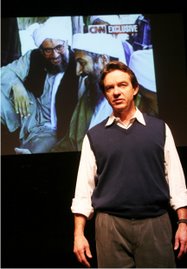...introduces the evening: We'll hear a history of surveillance law. He will act as prosecutor.
The court calls E. Holtzman (served in Congress 1972 - 1981) to the stand. She helped git Nixon ("git" in the "git-R-dun" sense as well as the typical one). She is now a private lawyer and writer. She also wrote The Impeachment of George W. Bush. (All of our friendly impeachment books have "impeachment" in their titles, no?)
The court (the performers) read the First and Fourth Amendments.
Kadidal and Holtzman discuss the legalities between wiretapping; the short version is, a court must, must approve wiretapping - all wiretapping. Not only the D.A.'s office, but an independent arbiter must approve wiretapping. "The mere fact of having a judicial review of wiretapping applications, is a restraint on wiretapping."
Kadidal asks why our Constitution's framers made a point to have the executive ask the judiciary for permission to search the citizens; Holtzman answers that the framers had experienced first-hand how illegal searches by the British had plagued the American people. Holtzman notes that no D.A. has complained about the theory behind the process by which wiretapping applications are approved (though they may gripe, one supposes, about individual processes).
The court quotes from the impeachment articles against Nixon, about wiretapping. You might mistake the words for ones about Bush, except that so far only a tiny minority of Democrats and we at Culture Project have taken the steps to try to impeach Bush.
The court notes that the government is now really good at "collecting information," meaning Google-good (in part, thanks to Google). What do "they" (who are they?) know about "us" (which grouping probably includes some of "they"/them)? They can know practically whatever they want. Doesn't mean the CIA will share the info with the FBI, or that the information will lead to any useful military info about, say, one homeless Arab guy on dialysis. But "they" can know a ton.
(Is/are Google/the government's linked servers artificially intelligent? That's my question. I mean, are we being used not only by a self-serving neo-con leadership, but also by an omni-computer addicted to knowin' stuff? It sounds silly to ask, I realize, but given the amount of sheer data in the world today, we're not necessarily far off from an era of a data-organism...)
We hear about the FBI taking on Dr. Martin Luther King, Jr., via surveillance. Holtzman points out that the FBI and the government in general worked very hard to collect info on, blackmail, discredit, and track the movements of various anti-Vietnam leaders.
Subscribe to:
Post Comments (Atom)




No comments:
Post a Comment